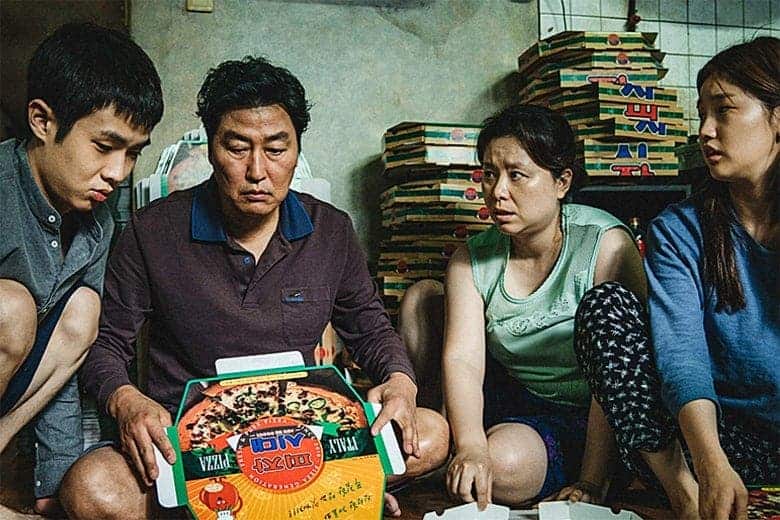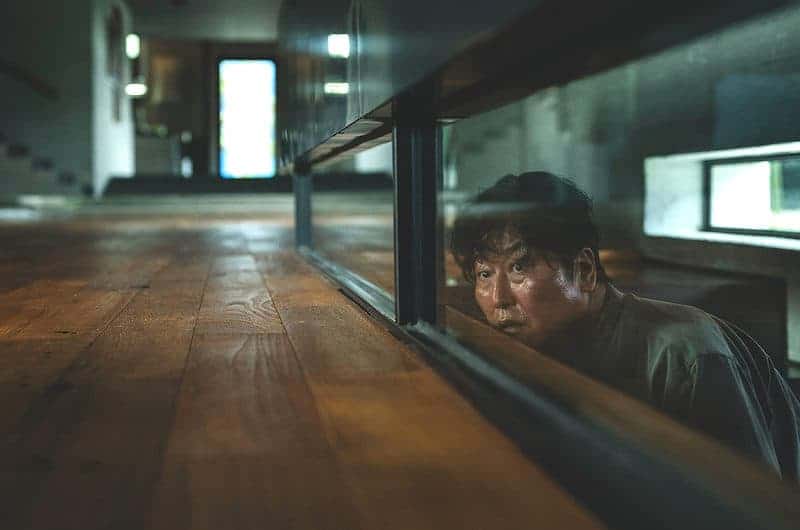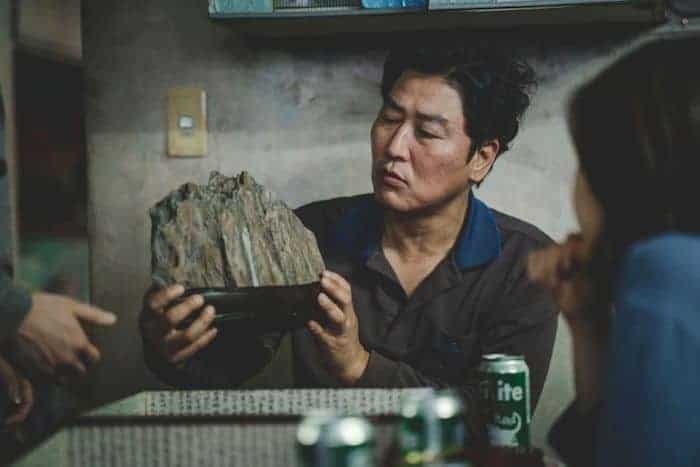Parasite, the new film by Korean auteur director Bong Joon Ho, is not only gorgeous to look at, it presents a harrowing satire on the state of class inequity in the 21st century. It’s hard to think of a recent film that packs this much metaphorical power. Set in Korea in the midst of a Dickensian disparity of wealth—the Kims live in basement squalor, the Parks live in upscale serenity. But it could be anywhere in the first world. It is here, right now, and that very fact provides the razor edge of recognition audiences feel in response to this darkly comic/existential romp that snatched the Cannes Festival’s Palme d’Or away from Quentin Tarantino (See my review of Tarantino’s “Once upon a time in Hollywood”.)
Parasite is a tale told through two families: the luckless, unemployed Kim Family headed by the extraordinary Kang-Ho Song as the father, Kim Chung-Sook as his wife, Choi Woo-Shik as teenaged son “Kevin” and Park So-Dam as his crafty hacker sister “Jessica. Determined to claw their way out of their ghetto squalor, the Kims scheme their way (I won’t spoil it) into the lives of the wealthy Park Family, led by Cho Yeo-jeong as the naive, lovely Mrs. Park and Lee Sun Gyun as style-conscious CEO Mr. Park.
 Before you know it the Kims, who’ll literally do anything to make money, manage to insinuate themselves into the heart of the Park’s splendid household. It is a symbiotic ecosystem made in the hellishly brilliant imagination of this director.
Before you know it the Kims, who’ll literally do anything to make money, manage to insinuate themselves into the heart of the Park’s splendid household. It is a symbiotic ecosystem made in the hellishly brilliant imagination of this director.
[Above we find the resourceful Kim siblings finding the best signal from their neighbor’s wifi right above the toilet.]
Mr. Kim becomes Mr. Park’s driver, Mrs. Kim is the new Park housekeeper after cleverly managing to get the former one fired (the scenes here are laugh out loud funny). The son becomes tutor (and lover) to the Park’s daughter, and his sister poses as an art therapist for the Park’s young son, who is obsessed with American Indians.
 The house itself is a key player in what will reveal itself to be Bong’s sly-handed tale of social inequity. An architectural masterpiece (designed by director Bong and made especially for the film) the sleek modernist house is laid out in interlocking levels. The living room’s enormous wall of glass overlooks an oasis of green lawn bordered by a manicured hedge.
The house itself is a key player in what will reveal itself to be Bong’s sly-handed tale of social inequity. An architectural masterpiece (designed by director Bong and made especially for the film) the sleek modernist house is laid out in interlocking levels. The living room’s enormous wall of glass overlooks an oasis of green lawn bordered by a manicured hedge.  This hermetic world insulates the Parks from any unsightly social reality and makes a painful contrast to the mess and chaos of the Kim’s basement apartment. Most importantly to the director’s storytelling, the house also contains a secret passage into yet another domain—and a ghastly secret buried deep within the heart of lavish wealth.
This hermetic world insulates the Parks from any unsightly social reality and makes a painful contrast to the mess and chaos of the Kim’s basement apartment. Most importantly to the director’s storytelling, the house also contains a secret passage into yet another domain—and a ghastly secret buried deep within the heart of lavish wealth.
Bong’s social commentary is never heavy handed, but it spares no one.
How this secret is discovered, what it contains, and where its layered metaphors lead are the elements driving a tsunami of loss, compassion, violence, joy, and ultimately a fairytale ending.

Parasite is powered by poetic cinematography, scored with Western classical music (another edgy dig at Korean social pretentions) and acted by a cast of brilliant players as capable of slapstick as heartbreak. I laughed my way through this film, even during its most terrifying scenes. The two families and the social codes they embody are turned inside out more than once, and never in predictable ways. All the actors are memorable, but especially lead player Kang-Ho Song, Mr. Kim [above], a frequent Bong collaborator. His broad face is roadmap of dashed dreams. As expressive as any Willem Dafoe, a savage/tender mirror reflecting Mr. Kim’s transformation—and his realization that his family’s larceny has triggered untold psychic damage. Nothing in Mr. Kim’s life has ever worked out, and Song’s face ultimately reveals despair on a Kierkegaardian scale. A great actor in a part worthy of his astonishing gifts.
Near the end of Parasite we find that just desserts are the main course of an outdoor birthday party for the spoiled Park son.  And once the shocking visual pyrotechnics have cooled down, the film draws to a haunting, eloquent close a la Charles Dickens. Desperate and ephemeral dreams, of the sort that reveal how much the rich and the poor are mutually bound in a slow dance of need, greed, hypocrisy, and desire.
And once the shocking visual pyrotechnics have cooled down, the film draws to a haunting, eloquent close a la Charles Dickens. Desperate and ephemeral dreams, of the sort that reveal how much the rich and the poor are mutually bound in a slow dance of need, greed, hypocrisy, and desire.
Parasite is a stunning cinematic fable, brilliant in every way, and for my money….unforgettable.



I don’t need to watch the movie after your exhaustive and detailed review. Can’t you leave anything to the imagination ? Too much information. You spoiled it.
I’m cranky today. My apologies.
Thank you for putting this film out for everyone to know/see.
Your review is intriguing.
Enjoyed reading your review! Especially about your detailed description of the scenes. I found that the movie poster shows the Kim family with black lines on their face while the rich Park family is crossed with white. I think it implies the “Host” and “Parasite” and their opposite perspectives. Eventually the “host” gets overthrown by the “parasite”… Also Kevin’s obsession with the landscape stone reflects that he chases rainbows and doesn’t do anything real to help the situation…:(